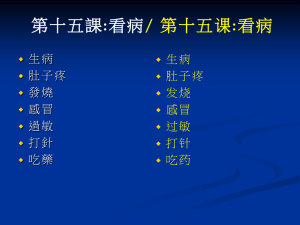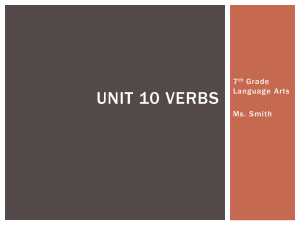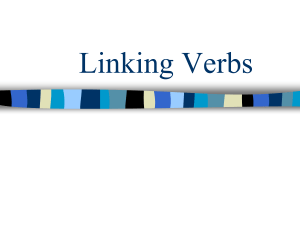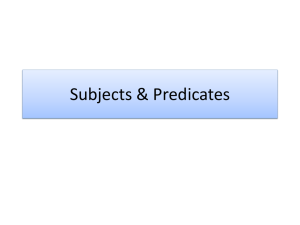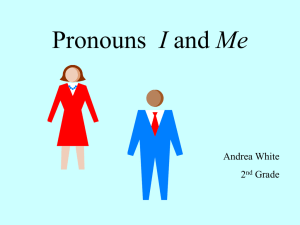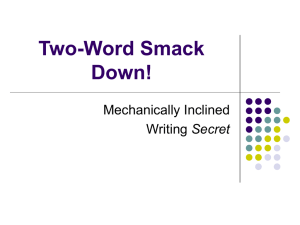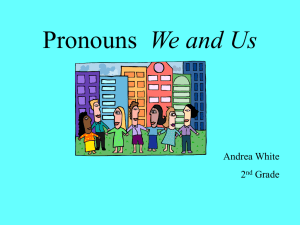Parts of Speech (1) - Home
advertisement
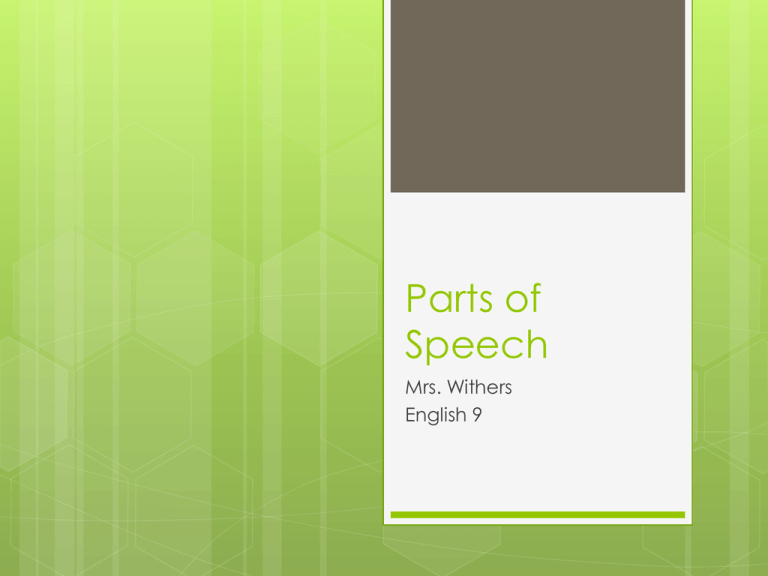
Parts of Speech Mrs. Withers English 9 Nouns, Verbs, Adjectives, and Adverbs Noun Verb An action word Adjective A person, place, or thing A word that describes a noun Adverb A word that describes a verb Usually ends in “-ly” Practice Identify the part of speech for the underlined words. 1. Odysseus escapes Poseidon’s wrath. 2. He flees quickly, in order to avoid persecution. 3. Telemachus searches unsuccessfully for his father. 4. Penelope’s enduring patience demonstrates her unyielding love for Odysseus. Subject Definition: The subject of a sentence is the person, place, thing, or idea that is doing or being something. Example: Hermes delivers a message to Calypso. Calypso acquiesces to Zeus’ mandate. Odysseus is the epic hero in The Odyssey. Direct Objects Definition: A direct object will follow a transitive verb (a type of action verb) Example: The brave soldiers defeated the men at Troy. The brave soldiers = subjects defeated= verb The brave soldiers defeated who? the men = direct object Direct Objects Subject + verb + who/what (direct object) Example: Penelope denies her suitors. Subject = Penelope Verb = mourns Direct Object (who/what) = suitors Direct Object Practice Circle the direct object in the sentences below. 1. Zeus commands Calypso to release Odysseus from captivity. 2. Odysseus stabs Polyphemus in the eye after he falls into a drunken stupor. 3. Athena helps Odysseus recover after Poseidon destroys his raft in a deadly storm. Indirect Objects For an indirect object to appear, a sentence must first have a direct object. Definition: When someone (or something) gets the direct object, that word is the indirect object Example: Calypso built Odysseus a raft so he could return home. Calypso = subject built = verb Calypso built what? raft = direct object Who got the raft? Odysseus= indirect object Indirect Objects Subject + verb + who/what (indirect object) + who gets the indirect object So that Odysseus would not die from his injuries, Athena grants him restful sleep. Subject = Athena Verb = grants Direct object = sleep Who gets the sleep? Indirect object = Odysseus Practice 1. Homer asks the Muses for assistance in telling his tale to the audience Subject = Verb = Direct Object = 2. Odysseus tells his stories of adventures for King Alcinous’ court. Subject = Verb = Direct Object = Indirect Object = Practice 3. To avoid death, Odysseus tells Polyphemus a lie. Subject = Verb = Direct Object = Indirect Object = 4. Polyphemus did not have plans for revenge, so Poseidon harasses Odysseus for him. Subject = Verb = Direct Object = Indirect Object = Predicate Nominative Definition: Predicate nominatives complete a linking verb and rename the subject. Predicate nominatives complete only linking verbs. Predicate Nominative What is a linking verb? Linking verbs connect the subject with the descriptive adjective. The linking verbs include the following: The helping verbs: is, am, are, was, were, be, being, and been The sense verbs: look, taste, smell, feel, and sound And verbs like: become, seem, appear, grow, continue, stay, and turn Predicate Nominatives I am a student. The subject is renamed. I student Brian Brian dancer He is the best dancer. is a talented architect. He architect Predicate Adjective A predicate adjective modifies the subject of the sentence, and is connected to the subject by a linking verb. Examples: Children grow older every day. The baby remains happy during her bath. Her lasagna smells scrumptious. Practice Directions: Circle only the predicate nominatives in the following sentences. 1. He is an excellent teacher. 2. I am a free thinker. 3. Jeopardy is a tough game show. 4. That lion was the king of the jungle. 5. The cat was old but was still a great rat-catcher. Practice Directions: Circle only the predicate adjectives in the following sentences. 1. That car is extremely fast. 2. These students are wonderful! 3. This test seemed really difficult but was actually really easy. 4. The apple pie smells delicious. 5. The computer used to be old and loud. 6. That woman is an amazing doctor because she is kind and caring. Practice Directions: Label each sentence part. Then identify the underlined word by writing its name on the line provided. ___________________1) These planes were beautiful. ___________________2) Snow and ice covered the streets. ___________________3) My best friend is Thomas. ___________________4) Everyone loves candy. ___________________5) The teacher gave us an assignment. Practice Directions: Label each sentence part. Then identify the underlined word by writing its name on the line provided. ___________________6) The children bounce the ball. ___________________7) I brought a balloon to Diane. ___________________8) Connor is the best writer in class. ___________________9) The baby needs a nap. __________________10) The students asked the teacher many questions. Practice Directions: Label each sentence part. Then identify the underlined word by writing its name on the line provided. ______________11) The building Andrea lives in is a brownstone. ______________12) Can you send me a letter? ______________13) We ate steak for dinner. ______________14) Our coffee is warm and sweet. ______________15) She gives violin lessons to Jacob.
